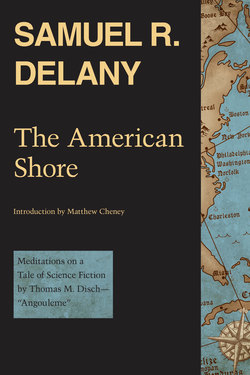Читать книгу The American Shore - Samuel R. Delany - Страница 15
На сайте Литреса книга снята с продажи.
4 The Diffused Text
ОглавлениеIn the structural consideration of a given work what must be structured is, of course, the consideration—the work under consideration presumably having its structure and whatever potential to convey it. We only hope the structure of our endeavor will provide an extensive enough scaffolding from which we may model1 those aspects of the work beneath that will illuminate our object. The form chosen for the consideration, then, must be determined by our intuitive apprehension of the work itself; for rich and efficient modeling there must be some initial intuited congruence. The form we have chosen, therefore, inspired by the text, is polysemous,2 detailed, and mutable.
1) ANGOULEME / Once sunk in its euphony, what the general American reader is most likely to take from the encounter with this first lexia is its mystery. Indeed, the most likely place for that general reader to have encountered the name before is the Duchesse d’Angoulême,3 of whom, by 1816, de Rollebon was the sole confidant—de Rollebon, the biographical subject of Antoine Roquentin, protagonist of Sartre’s La Nausée: the name, for an American, signals erudition as we proceed out from it in any direction. It sits at the head of the text, titling it and, for the general reader, entitling it to the mystery of that erudition. But the destruction of that mystery is one of the topical tasks of the text. During our first reading it revealed itself as a forgotten name for the American shore (as Crysopolis is the ancient name for Usküdar, the Asian shore of Istanbul), recondite, historical, a forgotten fact at a monument’s base. Here at our first lexia we recall that the revelation did not occur till our 42nd. But what of our 287th how long ago now completed? We have turned back to the title, as if reclaiming the word above the text (reclaiming the signifier from above the signified) were the only way to apprehend for certain what, indeed, it was the title of. “Angouleme”-the-story is a faulty algorithm4 for murder, a program for death that didn’t work—like a computer program for figuring out a problem that is ultimately memorable because of the mistakes it contains. “Angouleme”-the-title is the name of that program, as another might be named Pay Scale Differentiation 2-A, or Buster Brown Account, or Harry–B-7–December. By a simple semantic substitution and transformation we may read it, then: “The Forgotten name for America is a faulty algorithm for death”—if we believe in the fiction of semantics. This is—obviously—not what the title means. But it is one of the things (by that transformation) the title can say. Whether or not it says it strongly or weakly is a matter of whether or not we can apprehend, twice sieved through the tale’s double futurity (see commentary to lexia 2), enough of the texture and structure of the American society which the story orders up and organizes on and of our individual imaginative fields to argue for agreement—and of course whether or not one holds with this title transformation as a true statement about the American present: for science fiction is not about the future. It uses the future as a convention to present a significant distortion of the present. But the form of the distortion is covered neither by the exaggerative transformations of satire, parody, or lampoon; nor by the reductive transformations of fable, fairy tale, or fantasy: its essential transformative methods are random combination and orderly recomplication, which makes it linguistically unique. Science fiction can be seen as epistemologically ordered, informed, and redeemed surrealism—if we believe in the fiction of the surreal.
